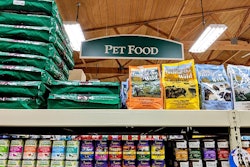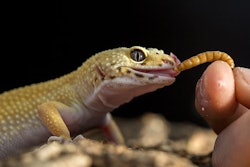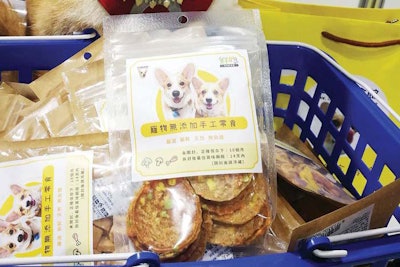
Pets are symbols of affluence in Taiwan. In this island nation of 24 million people, almost every household owns one pet on average, which, based on government data, collectively fuels an NT$20 billion (US$649 million) annual production value in pet-related products and services.
Taiwan’s pet ownership trends
Taiwan is one of the wealthiest economies in Asia, and rising incomes and strong western influences have resulted in more people acquiring pets. Latest industry estimates put the number of pet cats and pet dogs in Taiwan at 1.3 million and 1.7 million, respectively. Pet ownership rate is highest in Taipei, the capital city.
When it comes to pet dogs, most Taiwanese think the bigger the breed, the better, as this is an indication of a family's wealth and ownership of a spacious home. Shiba Inu and Poodles are the most popular dog breeds in Taiwan today.
But pet cats are increasingly becoming more popular than pet dogs as Taiwanese see felines as easier to maintain and generally cleaner than dogs. Data from the Executive Yuan R.O.C Council of Agriculture (COA) shows the country's pet cat population steadily growing faster than that of dogs since 2014. In 2017, some 220,000 cats were registered as pets, and the council expects to see the growth momentum in pet cats to continue.
More pets equals premium pet food growth
With more pets in affluent homes, steady demand for premium kibbles is guaranteed. Taiwan's image-conscious pet owners prefer top-of-the-line imported pet food from the United States and Europe, even though the retail cost is more than 10 times that of cheaper brands. The Foreign Agricultural Service (FAS) of the U.S. Department of Agriculture (USDA) said such high regard for U.S.-made pet food gives American companies a one-third share of the local market.
With this trend, Taiwan's pet food imports more than doubled over the past decade, from US$62.5 million in 2006 to US$141 million in 2016. According to FAS, the U.S. (31.6 percent) and Thailand (27 percent) are the two major suppliers, followed by France (13 percent), Australia (7.6 percent) and Canada (6.9 percent). This is despite the lingering ban on ruminant products from countries determined by Taiwan's agriculture council to have Bovine Spongiform Encephalopathy (BSE).
“U.S. facilities producing pet food with non-ruminant ingredients may be subject to an extensive application process including on-site review and inspection by COA's Bureau of Animal and Plant Health Inspection and Quarantine division at the facility's own expense,” said FAS in its report. “U.S. exporters are encouraged to pay close attention to the highly pathogenic avian influenza (HPAI) quarantine status in the U.S. as Taiwan requires additional manufacturing processes for pet food products from HPAI infected areas.”
Taiwan’s local pet food production
Most pet food in Taiwan is imported, and the major players are Mars, Nestle and Hills Pet Nutrition. Nipping at their heels, however, are two domestic pet food manufacturers, Uni-President Enterprises Corp. and Fwusow Industry Products, which have become pet food giants themselves with homemade labels that closely compete with premium brands from abroad. With three more Taiwan pet food manufacturers, COA said the country's local pet food manufacturing output accounts for 40 percent of the total market.
“Many Taiwanese prefer to buy imported dog food, but in supermarkets our local brand of dog food called Greens is second in terms of revenues. Greens is also the No. 1 cat food brand for the budget market here,” said Cony Yeh, marketing and product manager at Fwusow.
Fwusow, a 98-year-old company that started as a small peanut oil factory, is currently the biggest pet food manufacturer in Taiwan that targets both the high and low end of the market. It expanded to pet foods in 2000 when most locals still fed their pets food scraps.
Yeh said they can compete with international pet food companies because it is easy for them to control their costs while making sure their products are fresh. “Our Greens brand is very affordable,” she said. “For our cat food, a 1.5 kilogram bag sells for only NT$189 (US$6.15). But though cheap, our products follow the nutritional value set by the U.S. AAFCO (Association of American Feed Control Officials).”
Millennials: a new target market
While commercial pet food, premium or otherwise, is a staple in every pet-loving home in Taiwan, a new market segment, mainly made up of millennial pet owners, is pushing the envelope when it comes to pet meals. As a result, new ideas and business opportunities that explore the use of nontraditional ingredients and new delivery systems have come about.
At the 2018 Taipei Pets Show, several local players showcased a raft of previously non-existent products and creative solutions that appeal strongly to the younger set of pet owners. One of these companies is Furkid Food Taiwan, which specializes in fresh meals for dogs and cats.
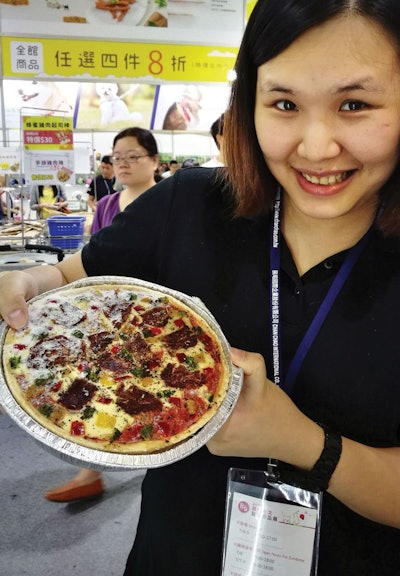
According to Furkid CEO Zhuang Ru Lin, Taiwan’s fresh pet food market is a small but growing segment of the industry. | Photo by Alma J. Buelva
Last year, Furkid made US$1.4 million in revenue selling dry, frozen and room-temperature pet meals such as ready-to-eat sausages and meatballs for dogs, steamed shark and fish roe meals for cats and a wide array of dry treats for both animals. Variety is the spice of life and Furkid has over 100 recipes for cats and dogs that their young market can choose from.
“Furkid currently owns 70 percent of the Taiwan fresh pet food market,” said Zhuang Ru Lin, founder and CEO of Furkid. “It is still a small market, but our company is attracting international buyers and we are looking at exporting.”
A millennial herself, Zhuang said Taiwan's fresh pet food market accounts for about 30 percent of the total pet food industry. The rest (70 percent) is for dry and canned pet foods.
Also breaking new ground in dog and cat food is Brimoon Pet Care, manufacturer of pet food supplements and wet varieties with soft-shell turtle as the main ingredient. The company owns a 10-acre turtle farm used to create their wet and powder supplement pet food under the labels Chew Me and Twinkling Star.
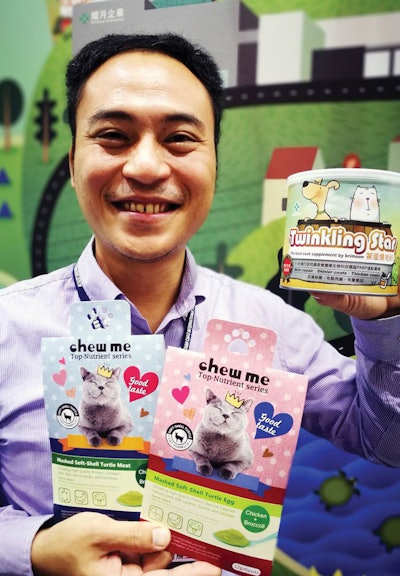
Brimoon Pet Care boasts a novel ingredient as the star of their pet product portfolio: soft-shell turtle. | Photo by Alma J. Buelva
Brimoon has plans to make kibble using turtle as the key ingredient. A Brimoon official said millennial pet owners are more curious and interested to let their pets try food with new ingredients like turtles, which aside from being exotic are also quite rich in amino acids and omega-3 fatty acids.
Better health for pets is also the main proposition of Nu4Pet, a subscription-based pet food service that creates “bespoke” meals for individual pets.

Nu4Pet focuses on customized formulations for its mail-order customers, a service company founder Sandy Kuo says hasn’t yet hit its stride but is attracting more and more interest. | Photo by Alma J. Buelva
Nu4Pet customizes pet food for dogs and cats under the guidance of in-house pet nutritionists. With its own extruder machine, the company is able to service 10,000 Taiwan customers so far who signed up for either monthly or yearly subscriptions.
Nu4Pet personalized pet meals are customized according to the pet's age, weight, activity level and diet, among other specifications. Every month, a subscriber (with a cat or dog) gets 32 packs of dry food.
“For example, there is more fiber in the custom food for dogs that are overweight,” said Sandy Kuo, one of the owners of Nu4Pet. “Cats that need more iron are given formulas with chicken and fish. We tweak our main recipes in terms of ratio and ingredients to suit individual requirements. This type of service is not yet hugely popular but we are attracting customers, young pet owners in particular, who can appreciate that not all dogs and cats eat the same way.”
The future of pet food in Taiwan
As established pet food companies and trendsetting companies alike vie for the market, Taiwan's pet food industry is only headed for further growth in the coming years. By 2020 it is expected to be able to support an estimated 5.5 thousand metric tons and 25.7 thousand metric tons of wet and dry pet food, respectively, according to research firm Mordor Intelligence. That's a lot of food for Taiwan's meowing and barking status.




